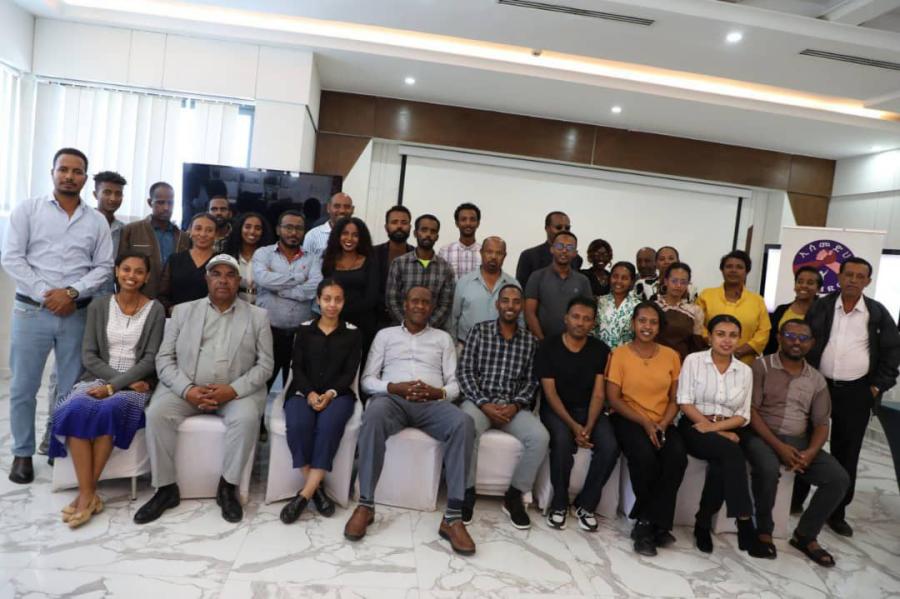The Anuak are a tribal minority living as agriculturists in the fertile Gambela region of Western Ethiopia. In the Abyssinian Empire many became slaves and were taken to Addis Ababa and other large towns where they worked as domestic servants and carriers. Slavery was abolished in the area when it came under British rule in the early 20th century, but it was resorted when the Gambela region was ceded to Ethiopia after World War II. Even during the "free" period many Anuak were still kept as slaves or born as slaves in other parts of Ethiopia. Slaves or born as slaves in other parts of Ethiopia. Slavery is officially illegal in Ethiopia today, but Anuak claim that they are still treated as an inferior group and that their condition has deteriorated over the past few years.
The rich lands of the Anuak, watered by the Baro and Akobo Rivers, have been marked recently for a large-scale agricultural project by the Ethiopian government. Plans for the development of the region were first outlined under Us direction, but the final proposal was submitted to the European Economic Commission with whom an agreement was signed in 1978. The project calls for land clearing and the construction of dams and fences, the latter, to bar elephants and other animals from agricultural lands. Most important, however, the plan calls for the displacement of the Anuak people from their lands and resettlement of the Anuak people from their lands and the resettlement of the area by the Amhara, the ethnic minority which rules the country. The importation of the Amhara, mainly from the Wollo Province, into the Gambela region constitutes part of the government's plan to move a quarter of a million Amhara into Southern Ethiopia.
After clearing their lands at the end of the last harvest, many Anuak saw their lands seized by the government. Their animals were also appropriated as food for the army. Landless and destitute, many Anuak fled to the bush and are trying to make their way to Sudan. Having driven the Anuak from their lands, the government is not willing permit the Anuak easy access to Sudan. Movement within Ethiopia is obstructed by the government's internal permit system which prohibits movement from one village to another. Many Anuak have been killed in their attempts to reach the Sudan, and others have been bombed by Ethiopian planes as they seek shelter in the bush.
Of these Anuak who manage to elude government attacks on their trek to Sudan, many are killed at the border. On 7 July 1979, ten refugees were killed by Ethiopian helicopter gunships as they attempted to cross the border. Another group was caught on the bridge spanning the Baro River. They were pushed into the water and only a handful escaped drowning. Sudanese police confirmed that three more were shot just as they reached Sudanese soil. Later the same day a pitched battle took place between Anuak fleeing to Sudan and the police near the Ethiopian village of Qodaga, leaving 27 Anuak and 3 Ethiopians dead.
In addition to government efforts to evict the Anuak from their lands, there has been an attempt to draft the Anuak into the army. Raids for "recruits" usually take place at night at which time armed Kebele guards and security police search the peasants' huts for male occupants and herd them away. The Anuak claim that recent "recruits" are being charged the equivalent of US $4 for transport to training camps. If they do not have the money, they are held in prison until the required amount is forthcoming. Reputedly several individuals who could not raise the funds have been shot.
The Anuak in Sudan give details of men, blinded or maimed in the fighting in Eritrea, who finally return to their villages after two years of service. Relatives are responsible for retrieving the severely wounded who are sheltered temporarily in military hospitals in other parts of the country. If no one comes to collect the wounded, they are discharged. Anuak recruits do not receive medical treatment, compensation, or pensions. The Anuak now resist conscription with the primitive weapons at their disposal. The say they will not fight 'unknown' enemies who have done them no personal harm. The Anuak want political autonomy and the right to decide their affairs. These sentiments have led to further repression by the Ethiopian government.
The government suspects the loyalty of most of the populations living near the Sudan border, especially groups traditionally residing in both countries. The government is therefore determined to replace them with loyal Amhara. Thus, what is happening to the Anuak could happen to other border groups.
But, the Anuak cannot survive without their lands. There are no plans to resettle them elsewhere in the country. If they cannot flee to the Sudan they face starvation in the bush. Today the total Anuak population is half of what it was a generation ago; but for the Amhara, whose traditional contempt for the Anuak as slaves and property continues, the Anuak are expendible.
Article copyright Cultural Survival, Inc.

